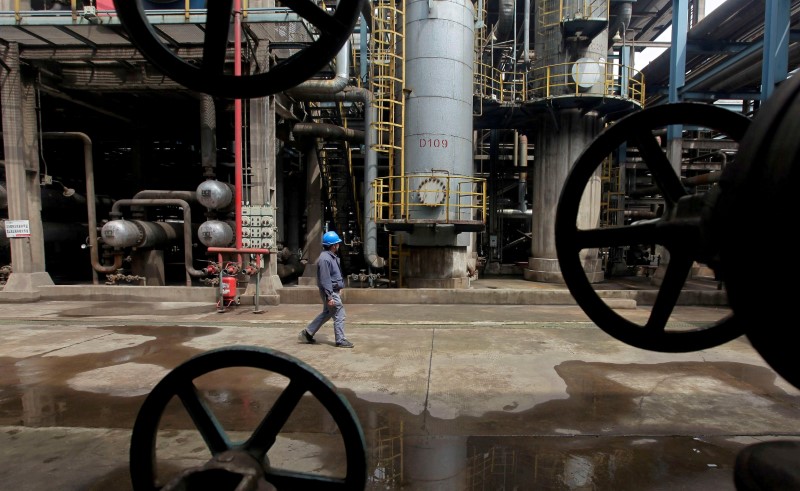* U.S. non-farm payrolls beat expectations in June
* Sharp drop in U.S. crude stockpiles supports prices
* U.S. coronavirus rise could stall fuel demand recovery
(New throughout; updates prices, market activity and comments;
changes byline and dateline, previous LONDON)
By Laila Kearney
NEW YORK, July 2 (Reuters) - Oil futures were little changed
on Thursday, supported by a fall in U.S. unemployment and
Wednesday's drawdown in crude inventories, but the spike in U.S.
coronavirus infections fanned concerns that economic activity
will weaken in coming weeks.
New COVID-19 cases in the United States rose by nearly
50,000 on Wednesday, according to a Reuters tally, the biggest
one-day spike since the start of the pandemic.
Numerous states are advising citizens to restrict movements
and closing bars and restaurants again, which is expected to
hamper further job growth. Brent crude LCOc1 futures gained 10 cents to trade at
$42.13 a barrel by 11:17 a.m. EDT (1517 GMT), after rising 1.8%
in the previous session. U.S. West Texas Intermediate (WTI)
crude CLc1 futures lost 18 cents to $39.64 a barrel after a
1.4% rise on Wednesday.
U.S. non-farm payrolls increased by 4.8 million in June, the
Labor Department reported, beating expectations, even as
permanent job losses rose. Traders said the data could lessen
the desire in Washington for more federal support for the
economy.
"The jobs report was good, but the flip side of that was
that it was so good that it might inhibit a stimulus program,"
said Bob Yawger, director of energy futures at Mizuho.
U.S. crude inventories USOILC=ECI fell 7.2 million barrels
from a record high last week, far more than analysts had
expected, U.S. Energy Information Administration data showed, as
refiners ramped up production and imports eased. EIA/S
Gasoline stockpiles were higher, however, and the spike in
cases in heavily populated U.S. Sun Belt states, among the
country's biggest consumers of gasoline, could hit fuel demand
headed into the July 4 holiday weekend, often a busy period for
road travel. "Key uncertainty now remains on demand recovery," Harry
Tchilinguirian, head of commodity research at BNP Paribas, said.
- English (USA)
- English (UK)
- English (India)
- English (Canada)
- English (Australia)
- English (South Africa)
- English (Nigeria)
- Deutsch
- Español (España)
- Español (México)
- Français
- Italiano
- Nederlands
- Português (Portugal)
- Polski
- Português (Brasil)
- Русский
- Türkçe
- العربية
- Ελληνικά
- Svenska
- Suomi
- עברית
- 日本語
- 한국어
- 简体中文
- 繁體中文
- Bahasa Indonesia
- Bahasa Melayu
- ไทย
- Tiếng Việt
- हिंदी
UPDATE 6-Oil prices steady amid U.S. unemployment, fuel demand concerns
Published 07/02/2020, 10:05 AM
Updated 07/02/2020, 11:40 PM
UPDATE 6-Oil prices steady amid U.S. unemployment, fuel demand concerns

Latest comments
Install Our App
Risk Disclosure: Trading in financial instruments and/or cryptocurrencies involves high risks including the risk of losing some, or all, of your investment amount, and may not be suitable for all investors. Prices of cryptocurrencies are extremely volatile and may be affected by external factors such as financial, regulatory or political events. Trading on margin increases the financial risks.
Before deciding to trade in financial instrument or cryptocurrencies you should be fully informed of the risks and costs associated with trading the financial markets, carefully consider your investment objectives, level of experience, and risk appetite, and seek professional advice where needed.
Fusion Media would like to remind you that the data contained in this website is not necessarily real-time nor accurate. The data and prices on the website are not necessarily provided by any market or exchange, but may be provided by market makers, and so prices may not be accurate and may differ from the actual price at any given market, meaning prices are indicative and not appropriate for trading purposes. Fusion Media and any provider of the data contained in this website will not accept liability for any loss or damage as a result of your trading, or your reliance on the information contained within this website.
It is prohibited to use, store, reproduce, display, modify, transmit or distribute the data contained in this website without the explicit prior written permission of Fusion Media and/or the data provider. All intellectual property rights are reserved by the providers and/or the exchange providing the data contained in this website.
Fusion Media may be compensated by the advertisers that appear on the website, based on your interaction with the advertisements or advertisers.
Before deciding to trade in financial instrument or cryptocurrencies you should be fully informed of the risks and costs associated with trading the financial markets, carefully consider your investment objectives, level of experience, and risk appetite, and seek professional advice where needed.
Fusion Media would like to remind you that the data contained in this website is not necessarily real-time nor accurate. The data and prices on the website are not necessarily provided by any market or exchange, but may be provided by market makers, and so prices may not be accurate and may differ from the actual price at any given market, meaning prices are indicative and not appropriate for trading purposes. Fusion Media and any provider of the data contained in this website will not accept liability for any loss or damage as a result of your trading, or your reliance on the information contained within this website.
It is prohibited to use, store, reproduce, display, modify, transmit or distribute the data contained in this website without the explicit prior written permission of Fusion Media and/or the data provider. All intellectual property rights are reserved by the providers and/or the exchange providing the data contained in this website.
Fusion Media may be compensated by the advertisers that appear on the website, based on your interaction with the advertisements or advertisers.
© 2007-2024 - Fusion Media Limited. All Rights Reserved.